Photographs: Sivaram V/Reuters
Not surprisingly, for an admiral known for speaking his mind, it was a speech marked by characteristic candour:
We often hear that our rise to global prominence is inevitable. It is an incontestable fact that the significance of India as a rising power is being widely acknowledged, as has been witnessed by several events in the recent past, the most defining of which has perhaps been the inking of the agreement on civil nuclear cooperation with the United States.
Our growing economic status fuelled by a 300 million strong middle class, the demographic advantage of a burgeoning 'young population', our increasing ventures into high technology areas such as space, and future projections of national growth peg us amongst the world's top five economies by 2020. That is just 11 years away.
The professionalism and military might of the armed forces of India are respected the world over. The very recent launch of our very own nuclear submarine 'Arihant' has also sent out a strong signal of our desire to acquire the appropriate strategic military technology and capability.
Despite our several internal challenges and diversities, we are 'rock solid' as a democratic country, surrounded by an extended periphery of varying instability.
It is therefore not surprising that the role of a 'natural' regional power is expected of us. Our aspirations for inclusion as a permanent member of the UN Security Council and for a greater voice in international diplomacy are a result of these developments.
However, there is a sense that we may not have done adequately rigorous thinking on how to 'manage' our pre-ordained rise to global prominence. With the realisation of our aspirations and greater international recognition will come many more additional responsibilities.
The country cannot afford to be indifferent and non-committal on any regional or global issue -- we must have an objective 'national interest assessment' on all questions of importance.
As military forces of India, we would be expected to function as instruments of peace and stability in this rather fragile environment of the Indian Ocean region. We have to get our 'hands dirty' in addressing common concerns in our respective domains. This will call for increased participation in peace operations, efforts such as anti-piracy as also capacity-building and capability-enhancement of smaller and economically weaker nations which look up to us, for support and security.
We must also be seen far away from our shores, working with friendly nations and shaping perceptions, in furtherance of India's foreign policy. Quite evidently, the navy would lead efforts of military diplomacy, given the medium in which it operates and the distinctive characteristics of its platforms. If we pursue a meaningful foreign policy to advance national objectives -- as we do -- then the military instrument can complement this collective endeavour.
Coping with China
Image: Chinese People's Liberation Army troops celebrate the PLA's 82nd anniversary.Photographs: Reuters
Once that is done, China is likely to be more assertive on its claims, especially in its immediate neighbourhood. Our 'trust deficit' with China can never be liquidated unless our boundary problems are resolved. China's known propensity for 'intervention in space' and 'cyber-warfare' would also be major planning considerations in our strategic and operational thinking.
Common sense dictates that cooperation with China would be preferable to competition or conflict, as it would be foolhardy to compare India and China as equals. China's GDP is more than thrice that of ours and its per capita GDP is 2.2 times our own. China's early steps to liberalise its economy and invest heavily to modernise its physical infrastructure gave it a substantial edge over India, and made China a more preferred destination for FDI.
India's annual defence expenditure (approximately $30 billion for 2008-2009) is less than half of what China spends on defence. China's official figure is under $40 billion, but it is widely believed that China actually spends more than twice as much. Studies by US think-tanks peg China's defence spending to be anything between $70 billion to $200 billion.
Whether in terms of GDP, defence spending or any other economic, social or development parameters, the gap between the two is just too wide to bridge (and getting wider by the day). In military terms, both conventional and non-conventional, we neither have the capability nor the intention to match China, force for force. These are indeed sobering thoughts and therefore our strategy to deal with China would need to be in consonance with these realities.
The economic penalties resulting from a military conflict would have grave consequences for both nations. It would therefore, undoubtedly be in both our interests, to cooperate with each other in mutually beneficial endeavours, and ensure that the potential for conflict is minimised. This would require pro-active economic, diplomatic, cultural and people-to-people engagement. Our relations with other major powers, notably the USA, Russia, Japan and other East Asian nations need to be nurtured and leveraged to this end.
Our growing relations with South East and East Asian countries would increase opportunities for cooperative engagement with China as well. Since resolution of the border problems, autonomy of Tibet, the China-Pakistan connection, competition for strategic space in the Indian Ocean and management of water resources would be the prime causative factors for any potential tension with China, our diplomatic focus on these issues would have to be maintained.
On the military front, our strategy to deal with China must include reducing the military gap and countering the growing Chinese footprint in the Indian Ocean region. The traditional or 'attritionist' approach of matching 'division for division' must give way to harnessing modern technology for developing high situational awareness and creating a reliable stand-off deterrent.
The non-State actors
Image: Association of Southeast Asian Nations ministers and officials at the ASEAN Regional Forum in PhuketPhotographs: Sukree Sukplang/Reuters
We have witnessed an even more worrying phenomenon of the occasional coalescing of the 'State' with some 'non-State' entities which has created an evil-hybrid. This hybrid, to my mind, has been at the very root of the tragic events in Mumbai in November 2008.
.Where should we direct our security efforts? Towards the State-sponsor or the non-State entity? How do we expose the linkages, if any? We have been grappling with this problem for some time now with no satisfactory solution emerging.
Asia today, is witnessing the historical and simultaneous rise of at least four major powers namely, India, China, Japan and the ten countries of ASEAN. Even in these recessionary times, the economic performances of India, China and Indonesia are quite impressive.
On the other hand, Asia is also the ideological crucible of some of the world's ominous non-State forces. Maintaining economic growth, social development and harmony in the face of such disruptive forces will be a thorny problem for many years to come.
Responses to threats
This is a formidable challenge and no country, however large or powerful, has the wherewithal to insulate itself from such omnipresent threats, of which terrorism stoked by distorted religious radicalism is the latest and most grotesque manifestation.
Other universal concerns include threats from traffickers of drugs, arms, human beings, organised poachers, ships that clandestinely discharge oil and toxic cargo into the sea or onto the shores of unsuspecting and ill-informed States, mercenaries and modern-day pirates. In addition, there are several 'non-traditional security threats' as well.
These common challenges can only be faced through the common resolve of like-minded States, facilitated through multilateral structure as well as opportunities and mechanisms for constructive engagement. It will need a transformation in the way we think, and in the way we look at one another. It would also require those nations which have the necessary resources and wherewithal to take the lead in ensuring all forms of security to life, trade and property.
Concerted efforts at capability-enhancement and capacity-building of the smaller countries of the region, through active assistance of larger neighbours would be crucial to such efforts in the long term.
Shaping our immediate neighbourhood
Image: The North Korean ship MV Musan, which was detained by the Indian Coast Guard after a six-hour chase, anchored near Port Blair. The ship had entered Indian waters without the requisite permission or documents.Photographs: Sanjib Kumar Roy/Reuters
I am convinced that as India grows in economic and military stature, it would have to take upon itself, the role of further enabling its neighbours in ways that would not only enhance their own security, but contribute positively to regional stability as well.
On the navy-to-navy level, the Indian Ocean Naval Symposium or IONS, which was launched in February last year, is a significant military maritime construct to bring together regional navies and aimed at addressing common concerns. Our diplomatic utterances with regard to our maritime neighbours must be backed by cohesive engagement.
This requires much greater integration of thought and action between the ministries of external affairs, defence and the Indian armed forces. Our maritime neighbours are the gateways to our strategic frontiers. We need to engage them as much as they need our presence and support. It would be imprudent of us to leave voids in this strategic neighbourhood and watch others extend their influence in our backyard.
Securing our maritime borders
A word on coordination of maritime security closer to our coast. Preventing ingress of terrorists from the sea is an abiding challenge. Our long and porous coastline and several island territories, many of which are uninhabited, offer avenues for infiltration of men and material into our heartland, as well as safe havens for clandestine activities.
Intrusions via the sea are extremely difficult to prevent with our current state of material and organisational preparedness, as we were rudely shocked to realise, when the perpetrators of the Mumbai terror attacks breached the shores with impunity.
With a host of ministries and agencies being stake holders in the maritime arena, any attempt at coastal security will warrant a serious 'whole-of-government' approach, and robust coordination.
The entire sequence of surveillance extending out well beyond our Exclusive Economic Zone, suspicion indication, risk and threat assessments and finally investigation and prosecution is a very complex process, demanding a high level of situational awareness, rapid response and total synergy between all concerned enforcement agencies.
This kind of a capability is also technology-intensive, and obviously very expensive to set up and maintain. However, it must be done in the interest of national security, if we are to prevent intrusions and attacks through the sea route.
Our acute consciousness of 'turf guarding' must give way to a more synergistic way of functioning. A modest beginning has been made, which has to be sustained through concerted efforts of all stake holders, adequate funding and most of all, public awareness.
Internal security
Image: An Indian Air Force Mi-8 helicopter participates in a war exercise.Photographs: Amit Dave/Reuters
The addressing of these causes and maintenance of order are, nearly in all cases, a matter of internal governance and therefore, squarely within the purview of the civil administration and the police forces.
The rampant spread of left-wing extremism is particularly worrying and tackling the problem requires a well-thought out strategy.
However, the increasing demand on the armed forces to assume 'law and order' responsibilities is clearly an undesirable trend. While 'aid to civil authority' is a mandated role of the armed forces and they will deliver whenever ordered, this must always be a 'last resort' and 'temporary' measure to be expeditiously withdrawn when the critical need is met.
The armed forces must never be seen as being used 'against' our own population -- the irreversible damage of such action is there for all of us to see in our neighbourhood.
Intelligence
Much has also been reported about our handling of intelligence in the past and also in the aftermath of the 1999 Kargil war and more recently, the Mumbai terror attacks. Our intelligence agencies need to be more focussed towards long term intelligence forecasting and therefore, must direct efforts towards anticipatory security planning -- predicated on actionable intelligence inputs, in addition to immediate and short-term requirements.
Cohesion amongst intelligence agencies and sharing of intelligence in a far more integrated manner is an operational necessity. Integration between all organs of government dealing with intelligence and seamless acquisition, processing of strategic, operational and tactical intelligence and its timely dissemination is of essence.
Information exchange mechanisms with other friendly countries also need to be facilitated to enhance domain awareness in different arenas.
Cyber Warfare and Web Espionage
Image: Chinese troops learn to use computers at a military base in Tianjin.Photographs: Andrew Wong/Reuters
Primary targets include critical national infrastructure network systems with electricity, air traffic control, financial markets and government computer networks taking centre-stage. Reports suggest that the USA, Russia and China have acquired considerable capability in this domain.
The Indian armed forces are increasingly investing in networked operations, both singly and a joint fashion. We cannot, therefore, afford to be vulnerable to cyber attacks.
Information Technology is our country's known strength and it would be in our interest to leverage this strength in developing a formidable 'offensive' and 'defensive' cyber warfare capability. Harnessing the gene pool available in academia, private industry and the younger generation of talented individuals is imperative.
Nuclear Issues
Image: An activist protests the India-US nuclear deal in Mumbai.Photographs: Arko Datta/Reuters
We have had a well-thought our nuclear policy from the 1980s. India is committed to building a capability that will serve her interests and despite several attempts to 'isolate' us in the field of nuclear technology, especially post-1998, we have walked the path alone and created a capability that is recognised today, albeit grudgingly.
We have a draft nuclear doctrine in place, which is restrained, in keeping with our traditional national culture.
Our efforts at achieving credible deterrence are not just about weapons and platforms but also include well-thought out strategies, policies, targetting plans, command and control structures as well as an occasional demonstration of capability.
Our increasing forays in the nuclear field, both military and civilian, would require the highest assurances of nuclear surety and security within the country. This calls for substantial investments in safety and security procedures, testing of environmental parameters, accident prevention and disaster control as well as management.
It also requires a very high degree of awareness and public transparency in proving that our nuclear assets and establishments do not pose a hazard in any way to the population at large.
The culture of strategic thinking
Image: Soldiers with the navy's Landing Craft Mechanised vehicle during a war exercise.Photographs: Amit Dave/Reuters
Strategic decision-making cannot be guided by 'opinion' but by serious 'thought' -- but the reverse is sometimes true. It is unfortunate that discussions on national security in our country have been left largely to think-tanks and academics, and whilst they may do some valuable work in this direction, they lack the executive powers to put thought into action.
For a country of our size and stature, institutionalised strategic thinking mechanism within and outside government is woefully inadequate.
In several established democracies, specialist think-tanks have access to government information on a graded basis. They are often given contracts for studies to be done for the government departments.
In India, we often, jealously guard information, even if it may be required by other government agencies in the execution of their legitimate official duties. Our media too, barring honourable exceptions, has very few people who specialise in defence, though of late a welcome start has been made.
We have to develop much greater mutual interaction between think-tanks, the government, its agencies and the media. In a democracy, the media must be critical -- it is intrinsic to the profession -- but not needlessly adversarial, which is often the case in our country.


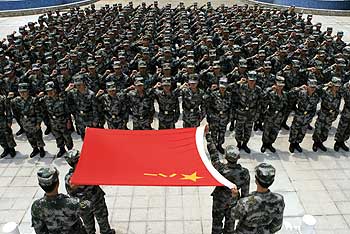
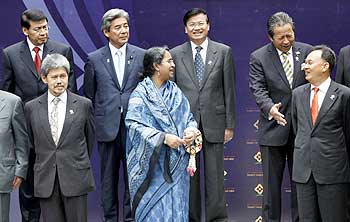

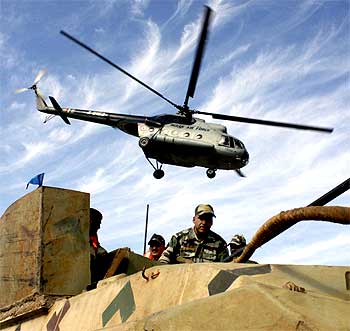
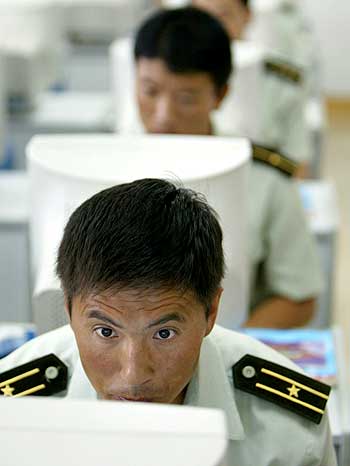
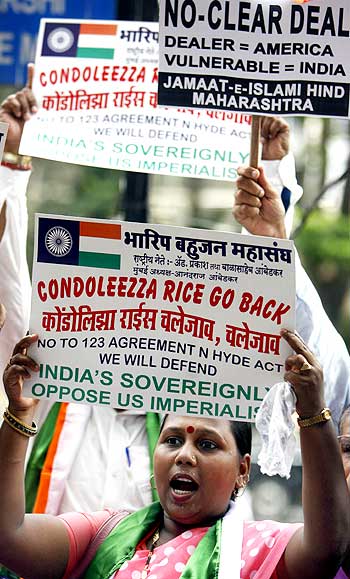
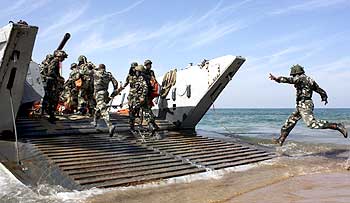
article